Module9Great inventionsUnit 2 Will books be replaced by the Internet习题课件(共35张PPT)
文档属性
| 名称 | Module9Great inventionsUnit 2 Will books be replaced by the Internet习题课件(共35张PPT) | 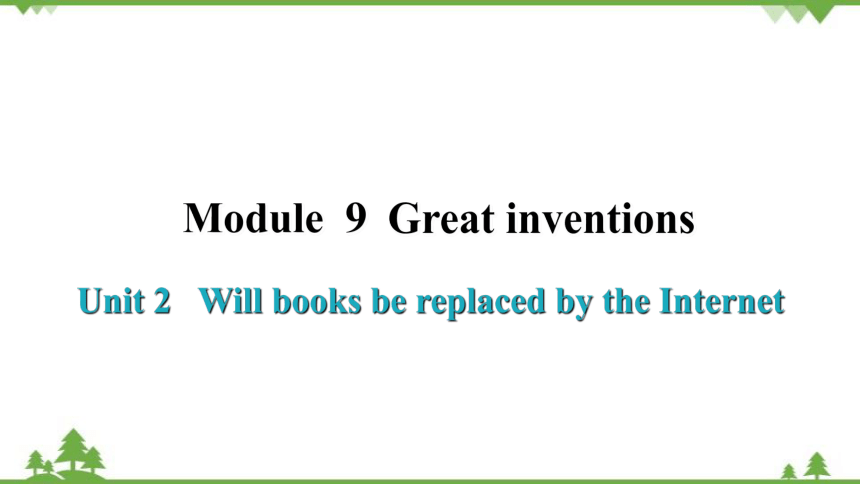 | |
| 格式 | ppt | ||
| 文件大小 | 200.0KB | ||
| 资源类型 | 教案 | ||
| 版本资源 | 外研版 | ||
| 科目 | 英语 | ||
| 更新时间 | 2022-06-20 10:29:43 | ||
图片预览

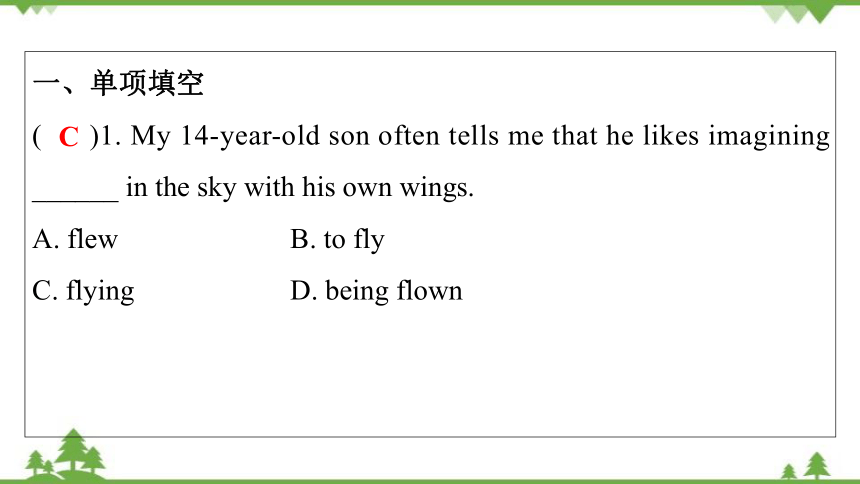
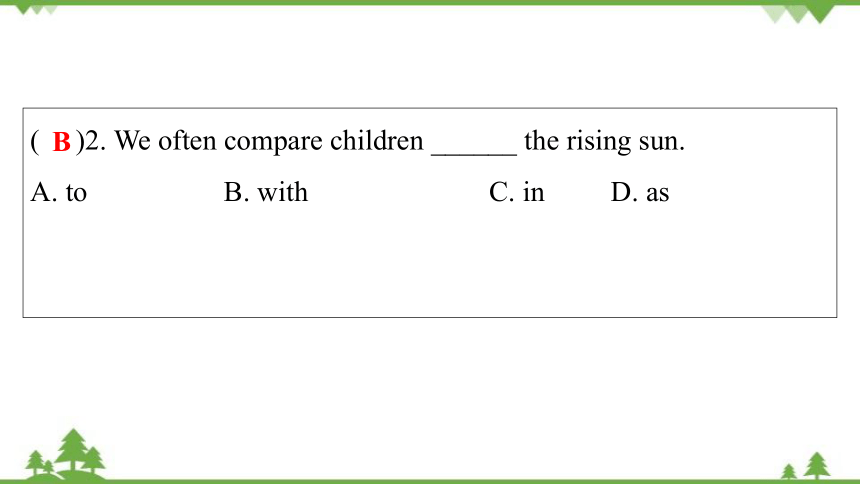
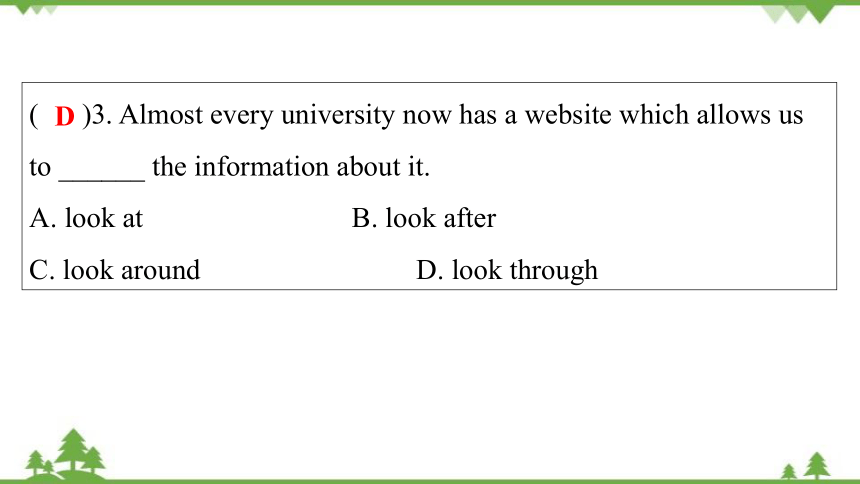
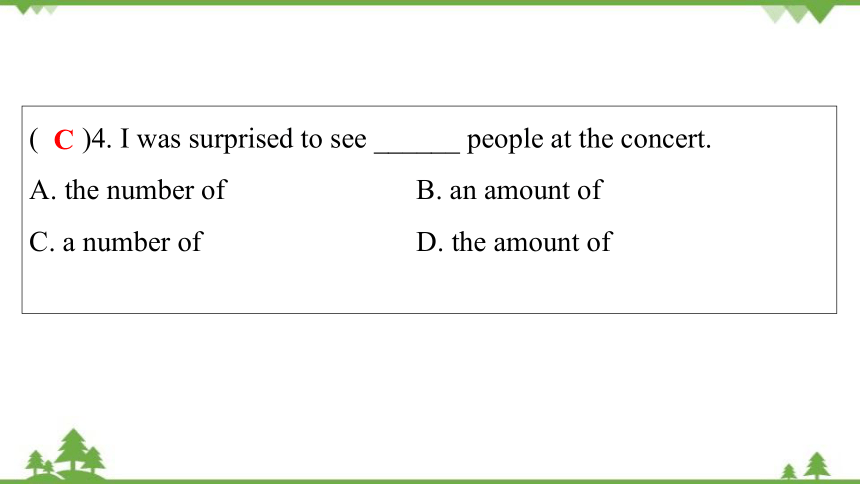
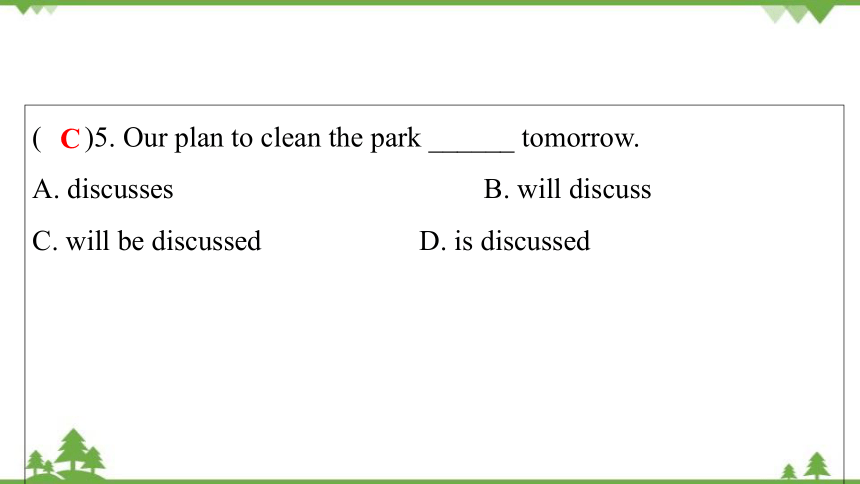
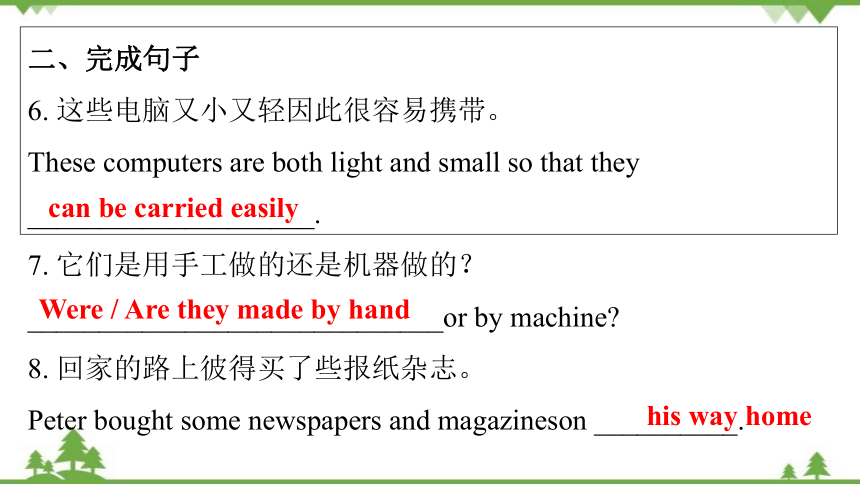
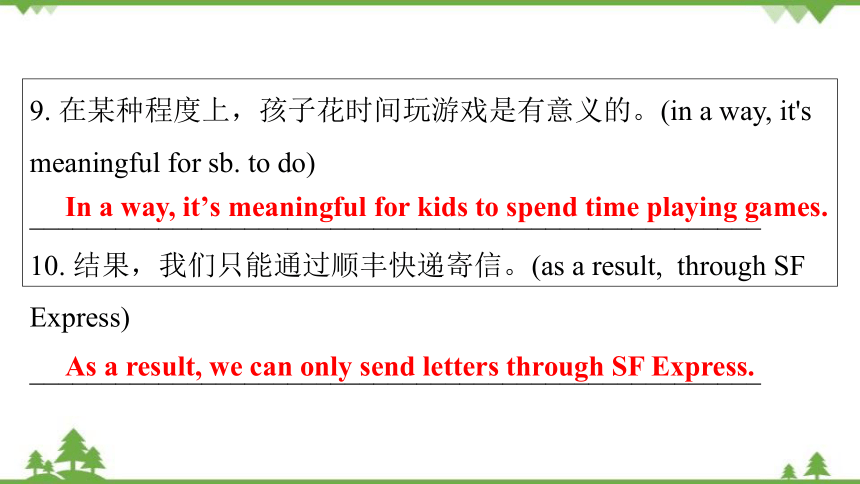
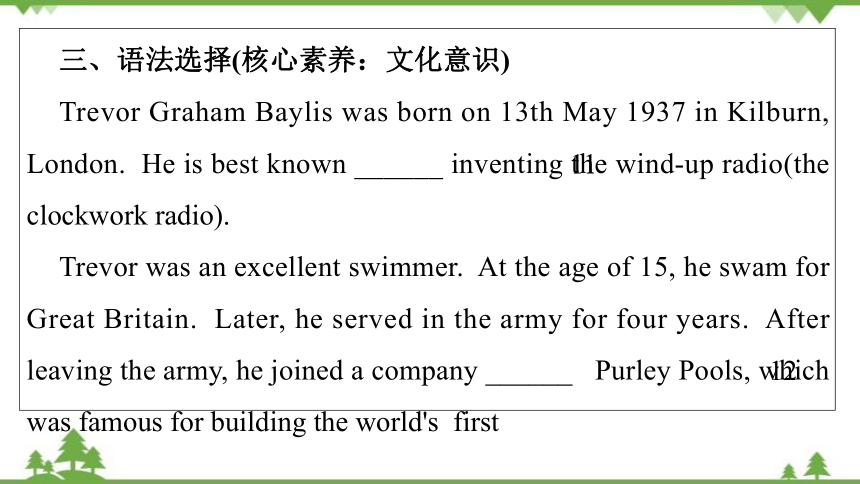
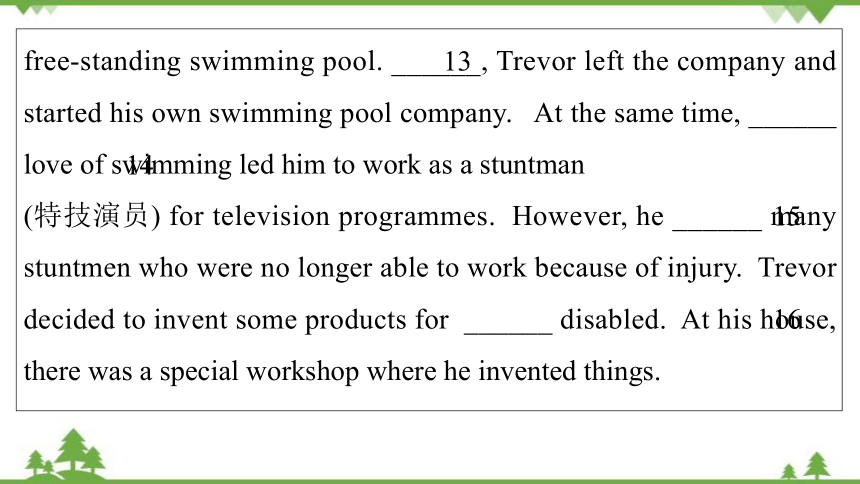
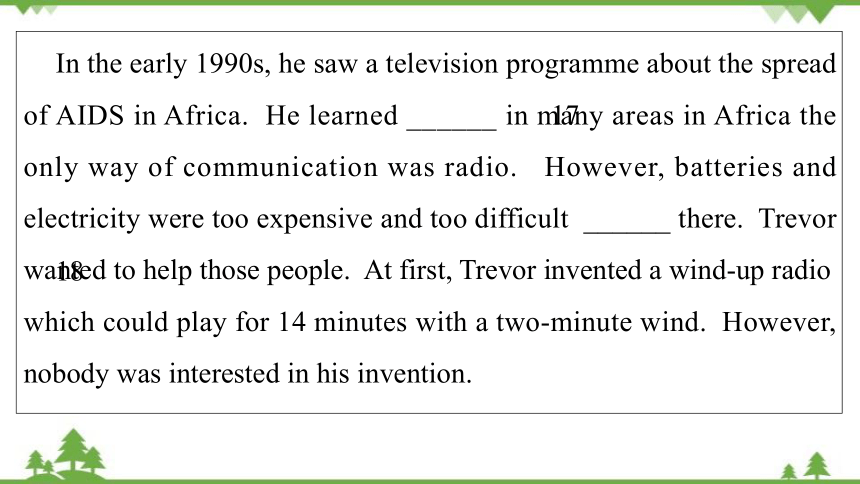
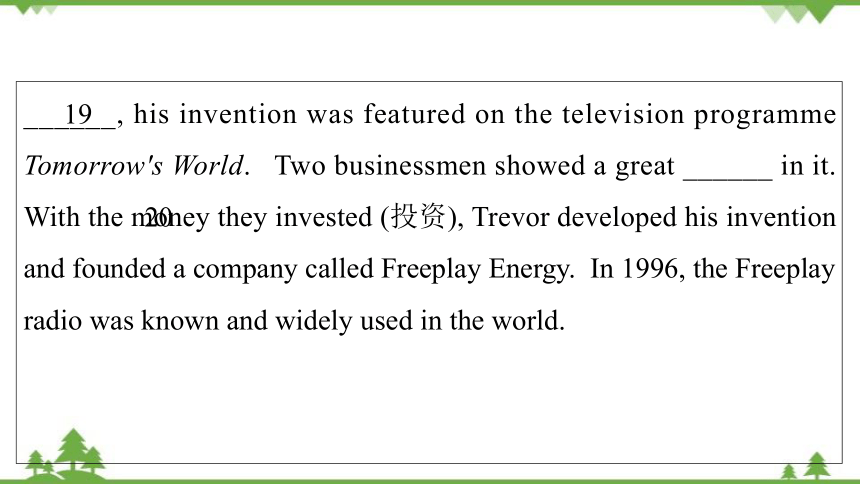
文档简介
(共35张PPT)
Module 9 Great inventions
Unit 2 Will books be replaced by the Internet
一、单项填空
( )1. My 14-year-old son often tells me that he likes imagining ______ in the sky with his own wings.
A. flew B. to fly
C. flying D. being flown
C
( )2. We often compare children ______ the rising sun.
A. to B. with C. in D. as
B
( )3. Almost every university now has a website which allows us to ______ the information about it.
A. look at B. look after
C. look around D. look through
D
( )4. I was surprised to see ______ people at the concert.
A. the number of B. an amount of
C. a number of D. the amount of
C
( )5. Our plan to clean the park ______ tomorrow.
A. discusses B. will discuss
C. will be discussed D. is discussed
C
二、完成句子
6. 这些电脑又小又轻因此很容易携带。
These computers are both light and small so that they ____________________.
7. 它们是用手工做的还是机器做的?
_____________________________or by machine
8. 回家的路上彼得买了些报纸杂志。
Peter bought some newspapers and magazineson __________.
can be carried easily
Were / Are they made by hand
his way home
9. 在某种程度上,孩子花时间玩游戏是有意义的。(in a way, it's meaningful for sb. to do)
___________________________________________________
10. 结果,我们只能通过顺丰快递寄信。(as a result, through SF Express)
___________________________________________________
In a way, it’s meaningful for kids to spend time playing games.
As a result, we can only send letters through SF Express.
三、语法选择(核心素养:文化意识)
Trevor Graham Baylis was born on 13th May 1937 in Kilburn, London. He is best known ______ inventing the wind-up radio(the clockwork radio).
Trevor was an excellent swimmer. At the age of 15, he swam for Great Britain. Later, he served in the army for four years. After leaving the army, he joined a company ______ Purley Pools, which was famous for building the world's first
11
12
free-standing swimming pool. ______, Trevor left the company and started his own swimming pool company. At the same time, ______ love of swimming led him to work as a stuntman
(特技演员) for television programmes. However, he ______ many stuntmen who were no longer able to work because of injury. Trevor decided to invent some products for ______ disabled. At his house, there was a special workshop where he invented things.
13
14
15
16
In the early 1990s, he saw a television programme about the spread of AIDS in Africa. He learned ______ in many areas in Africa the only way of communication was radio. However, batteries and electricity were too expensive and too difficult ______ there. Trevor wanted to help those people. At first, Trevor invented a wind-up radio which could play for 14 minutes with a two-minute wind. However, nobody was interested in his invention.
17
18
______, his invention was featured on the television programme Tomorrow's World. Two businessmen showed a great ______ in it. With the money they invested (投资), Trevor developed his invention and founded a company called Freeplay Energy. In 1996, the Freeplay radio was known and widely used in the world.
19
20
( )11. A. by B. for
C. of D. as
( )12. A. calling B. calls
C. called D. call
( )13. A. Later B. Latest
C. Late D. Lately
( )14. A. he B. his
C. he's D. him
B
C
A
B
( )15. A. has met B. was met
C. met D. was meeting
( )16. A. the B. a
C. / D. an
( )17. A. what B. how
C. where D. that
( )18. A. to get B. getting
C. gets D. got
C
A
D
A
( )19. A. Luck B. Lucky
C. Unlucky D. Luckily
( )20. A. interested B. interest
C. interesting D. interests
D
B
四、完形填空
There's good news for both robots and music lovers. It's reported that in the near future robots and humans will probably work together to ______ jazz.
21
Antonio Chella from Italy is working with a Telenoid ______. He wants to teach it to create jazz. To ______, the Telenoid robot will be trained to imitate (模仿) the movements and simple sounds made by a human musician. Then Chella will teach the Telenoid robot to ______ music with human emotions (情感). Chella said, “My Telenoid robot is special. It has the ______ to find connections between things.”
22
23
24
25
Philippe Pasquier, a musician and computer scientist, said, “The Telenoid robot's software has already been developed, but it is faced with a(n) ______ challenge (挑战). It is able to imitate the Beatles, a famous rock ______. However, what made the Beatles ______ was not only their music but their wonderful performance as well.”
26
27
28
It's not yet clear how a robot will ______ music. Pasquier said, “Human musicians often listen to others' music for a long time ______ they create music of their own, so Chella's robot had better listen to more jazz music first.”
29
30
( )21. A.read B. enjoy
C. hear D. create
( )22. A.fan B. software
C. robot D. inventor
( )23. A. agree with B. deal with
C. do with D. start with
( )24. A.fill B. connect
C. help D. provide
D
C
D
B
( )25. A.luck B. ability
C. time D. courage
( )26. A. old B. easy
C. big D. exciting
( )27. A. band B. song
C. festival D. concert
( )28. A. wise B. polite
C. honest D. famous
B
C
A
D
( )29. A. perform B. write
C. enjoy D. create
( )30. A. so B. because
C. before D. after
A
C
Soon computers and other machines will be able to remember you by looking at your eyes! The programme works because everyone's eyes are different. So in the future you won't have to remember a password when you want to use a machine or take money out of a bank. You'll just have to look at the machine and it will be able to tell who you are.
五、阅读理解(B篇)
The eye-recognition programme has already been tested in shops and banks in the US, Britain, Spain, Italy and Turkey. Soon, this technology will take the place of all other ways of finding out who people are.
Eye-recognition is a course of recognizing iris(虹膜), which includes the following steps. First, a kind of machine needs to collect different examples for one's iris from his eyes and store them. Second, when this person goes to the bank to draw
money, this machine will have iris feature extraction (特征抽取). Then, this machine will compare the examples kept in it with iris feature extraction. Once the examples and the feature extraction are the same, this person will be identified, and he will get the money from the bank successfully.
However, scientists are also working on other systems. Machines will soon be able to know you from the shape of your face, hand or even your smell! We've already had
machines that can tell who you are from your voice or your fingerprints. Eye-recognition is better because your eyes don't change as you get older, and don't get dirty like hands or fingers, and even twins have different eyes. This programme can be up to 94% correct, depending on how good the technology is. However, other programmes may only be 51%
correct now. In Britain, it was found that 90% of the people who had tried it said that they liked the idea of eye-recognition.
In the future, your computer will look at you in the eyes. So smile!
( )31. How does the eye-recognition programme work
A. You type in your password.
B. You say your name.
C. You look at the machine.
D. You show your ID card.
C
( )32. Which recognition is already in use according to the passage
A. Remembering smells.
B. Remembering fingerprints.
C. Remembering the shape of face.
D. Remembering eyes.
B
( )33. Which of the following is TRUE
A. The eye?recognition programme can be up to 51% correct.
B. In Britain, 90% of people said that they liked the idea of eye-recognition.
C. Everyone's eyes are different, and even twins have different eyes.
D. The eye-recognition programme is widely used now.
C
( )34. What's the passage mainly about
A. You don't have to remember a password when you draw money from a bank.
B. We already have machines that can tell who you are from your voice.
C. Tell people how the eye-recognition programme works and its advantages.
D. The eye-recognition programme has been tested in shops and banks.
C
( )35. Which of the following is RIGHT
A. You needn't remember a password when you draw money from a bank.
B. Machines can know you from your smell now.
C. Computers can tell who you are by looking at your eyes.
D. Machines can tell who you are from your voice.
D
六、短文填空
George Stephenson was an English civil engineer (土木工程师) and mechanical (机械的)engineer. He invented the train, one of the most important _____________ of the 19th century. He was born ______ 1781 in a poor family, and he was ______ second child of the family. Neither of his parents could read ______ write. He had to go to work _________ he was only eight years old. When George was fourteen, he
inventions
in
the
or
when
36.
37.
38.
39.
40.
_________ his father's helper. He _______ a lot of time studying engines(发动机). And on holidays he often broke one engine into pieces and studied each piece carefully. George invented many things in his life. The train was the __________ one among them. He made his ______ train when he was forty-four years old. The great inventor died in 1848. Today when we take _______ from one place to another, we’ll think of this great man—George Stephenson.
became
spent
greatest
first
trains
41.
42.
43.
44.
45.
Module 9 Great inventions
Unit 2 Will books be replaced by the Internet
一、单项填空
( )1. My 14-year-old son often tells me that he likes imagining ______ in the sky with his own wings.
A. flew B. to fly
C. flying D. being flown
C
( )2. We often compare children ______ the rising sun.
A. to B. with C. in D. as
B
( )3. Almost every university now has a website which allows us to ______ the information about it.
A. look at B. look after
C. look around D. look through
D
( )4. I was surprised to see ______ people at the concert.
A. the number of B. an amount of
C. a number of D. the amount of
C
( )5. Our plan to clean the park ______ tomorrow.
A. discusses B. will discuss
C. will be discussed D. is discussed
C
二、完成句子
6. 这些电脑又小又轻因此很容易携带。
These computers are both light and small so that they ____________________.
7. 它们是用手工做的还是机器做的?
_____________________________or by machine
8. 回家的路上彼得买了些报纸杂志。
Peter bought some newspapers and magazineson __________.
can be carried easily
Were / Are they made by hand
his way home
9. 在某种程度上,孩子花时间玩游戏是有意义的。(in a way, it's meaningful for sb. to do)
___________________________________________________
10. 结果,我们只能通过顺丰快递寄信。(as a result, through SF Express)
___________________________________________________
In a way, it’s meaningful for kids to spend time playing games.
As a result, we can only send letters through SF Express.
三、语法选择(核心素养:文化意识)
Trevor Graham Baylis was born on 13th May 1937 in Kilburn, London. He is best known ______ inventing the wind-up radio(the clockwork radio).
Trevor was an excellent swimmer. At the age of 15, he swam for Great Britain. Later, he served in the army for four years. After leaving the army, he joined a company ______ Purley Pools, which was famous for building the world's first
11
12
free-standing swimming pool. ______, Trevor left the company and started his own swimming pool company. At the same time, ______ love of swimming led him to work as a stuntman
(特技演员) for television programmes. However, he ______ many stuntmen who were no longer able to work because of injury. Trevor decided to invent some products for ______ disabled. At his house, there was a special workshop where he invented things.
13
14
15
16
In the early 1990s, he saw a television programme about the spread of AIDS in Africa. He learned ______ in many areas in Africa the only way of communication was radio. However, batteries and electricity were too expensive and too difficult ______ there. Trevor wanted to help those people. At first, Trevor invented a wind-up radio which could play for 14 minutes with a two-minute wind. However, nobody was interested in his invention.
17
18
______, his invention was featured on the television programme Tomorrow's World. Two businessmen showed a great ______ in it. With the money they invested (投资), Trevor developed his invention and founded a company called Freeplay Energy. In 1996, the Freeplay radio was known and widely used in the world.
19
20
( )11. A. by B. for
C. of D. as
( )12. A. calling B. calls
C. called D. call
( )13. A. Later B. Latest
C. Late D. Lately
( )14. A. he B. his
C. he's D. him
B
C
A
B
( )15. A. has met B. was met
C. met D. was meeting
( )16. A. the B. a
C. / D. an
( )17. A. what B. how
C. where D. that
( )18. A. to get B. getting
C. gets D. got
C
A
D
A
( )19. A. Luck B. Lucky
C. Unlucky D. Luckily
( )20. A. interested B. interest
C. interesting D. interests
D
B
四、完形填空
There's good news for both robots and music lovers. It's reported that in the near future robots and humans will probably work together to ______ jazz.
21
Antonio Chella from Italy is working with a Telenoid ______. He wants to teach it to create jazz. To ______, the Telenoid robot will be trained to imitate (模仿) the movements and simple sounds made by a human musician. Then Chella will teach the Telenoid robot to ______ music with human emotions (情感). Chella said, “My Telenoid robot is special. It has the ______ to find connections between things.”
22
23
24
25
Philippe Pasquier, a musician and computer scientist, said, “The Telenoid robot's software has already been developed, but it is faced with a(n) ______ challenge (挑战). It is able to imitate the Beatles, a famous rock ______. However, what made the Beatles ______ was not only their music but their wonderful performance as well.”
26
27
28
It's not yet clear how a robot will ______ music. Pasquier said, “Human musicians often listen to others' music for a long time ______ they create music of their own, so Chella's robot had better listen to more jazz music first.”
29
30
( )21. A.read B. enjoy
C. hear D. create
( )22. A.fan B. software
C. robot D. inventor
( )23. A. agree with B. deal with
C. do with D. start with
( )24. A.fill B. connect
C. help D. provide
D
C
D
B
( )25. A.luck B. ability
C. time D. courage
( )26. A. old B. easy
C. big D. exciting
( )27. A. band B. song
C. festival D. concert
( )28. A. wise B. polite
C. honest D. famous
B
C
A
D
( )29. A. perform B. write
C. enjoy D. create
( )30. A. so B. because
C. before D. after
A
C
Soon computers and other machines will be able to remember you by looking at your eyes! The programme works because everyone's eyes are different. So in the future you won't have to remember a password when you want to use a machine or take money out of a bank. You'll just have to look at the machine and it will be able to tell who you are.
五、阅读理解(B篇)
The eye-recognition programme has already been tested in shops and banks in the US, Britain, Spain, Italy and Turkey. Soon, this technology will take the place of all other ways of finding out who people are.
Eye-recognition is a course of recognizing iris(虹膜), which includes the following steps. First, a kind of machine needs to collect different examples for one's iris from his eyes and store them. Second, when this person goes to the bank to draw
money, this machine will have iris feature extraction (特征抽取). Then, this machine will compare the examples kept in it with iris feature extraction. Once the examples and the feature extraction are the same, this person will be identified, and he will get the money from the bank successfully.
However, scientists are also working on other systems. Machines will soon be able to know you from the shape of your face, hand or even your smell! We've already had
machines that can tell who you are from your voice or your fingerprints. Eye-recognition is better because your eyes don't change as you get older, and don't get dirty like hands or fingers, and even twins have different eyes. This programme can be up to 94% correct, depending on how good the technology is. However, other programmes may only be 51%
correct now. In Britain, it was found that 90% of the people who had tried it said that they liked the idea of eye-recognition.
In the future, your computer will look at you in the eyes. So smile!
( )31. How does the eye-recognition programme work
A. You type in your password.
B. You say your name.
C. You look at the machine.
D. You show your ID card.
C
( )32. Which recognition is already in use according to the passage
A. Remembering smells.
B. Remembering fingerprints.
C. Remembering the shape of face.
D. Remembering eyes.
B
( )33. Which of the following is TRUE
A. The eye?recognition programme can be up to 51% correct.
B. In Britain, 90% of people said that they liked the idea of eye-recognition.
C. Everyone's eyes are different, and even twins have different eyes.
D. The eye-recognition programme is widely used now.
C
( )34. What's the passage mainly about
A. You don't have to remember a password when you draw money from a bank.
B. We already have machines that can tell who you are from your voice.
C. Tell people how the eye-recognition programme works and its advantages.
D. The eye-recognition programme has been tested in shops and banks.
C
( )35. Which of the following is RIGHT
A. You needn't remember a password when you draw money from a bank.
B. Machines can know you from your smell now.
C. Computers can tell who you are by looking at your eyes.
D. Machines can tell who you are from your voice.
D
六、短文填空
George Stephenson was an English civil engineer (土木工程师) and mechanical (机械的)engineer. He invented the train, one of the most important _____________ of the 19th century. He was born ______ 1781 in a poor family, and he was ______ second child of the family. Neither of his parents could read ______ write. He had to go to work _________ he was only eight years old. When George was fourteen, he
inventions
in
the
or
when
36.
37.
38.
39.
40.
_________ his father's helper. He _______ a lot of time studying engines(发动机). And on holidays he often broke one engine into pieces and studied each piece carefully. George invented many things in his life. The train was the __________ one among them. He made his ______ train when he was forty-four years old. The great inventor died in 1848. Today when we take _______ from one place to another, we’ll think of this great man—George Stephenson.
became
spent
greatest
first
trains
41.
42.
43.
44.
45.
同课章节目录
- Module 1 Wonders of the world
- Unit 1 It's more than 2,000 years old.
- Unit 2 The Grand Canyon was not just big.
- Unit 3 Language in use
- Module 2 Public holidays
- Unit 1 My family always go somewhere interesting a
- Unit 2 We have celebrated the festival since the f
- Unit 3 Language in use
- Module 3 Heroes
- Unit 1 She trained hard,so she became a great play
- Unit 2There were few doctors, so he had to work ve
- Unit 3 Language in use
- Module 4 Home alone
- Unit 1 I can look after myself, although it won’t
- Unit 2 I became so bored with their orders that I
- Unit 3 Language in use
- Module 5 Museums
- Unit 1 Don't cross that rope!
- Unit 2 If you ever go to London, make sure you vis
- Unit 3 Language in use
- Module 6 Problems
- Unit 1 If I start after dinner, I'll finish it be
- Unit 2 If you tell him the truth now, you will sho
- Unit 3 Language in use
- Revision Module A
- Module 7 Great books
- Unit 1 We're still influenced by Confucius's idea
- Unit 2 It is still read and loved.
- Unit 3 Language in use
- Module 8 Sports life
- Unit 1 Daming wasn't chosen for the team last time
- Unit 2 He was invited to competitions around the w
- Unit 3 Language in use
- Module 9 Great inventions
- Unit 1 Will computers be used more than books in t
- Unit 2 Will books be replaced by the Internet?
- Unit 3 Language in use
- Module 10 Australia
- Unit 1 I have some photos that I took in Australia
- Unit 2 The game that they like most is Australian
- Unit 3 Language in use
- Module 11 Photos
- Unit 1 He's the boy who won the photo competition
- Unit 2 The photo which we liked best was taken by
- Unit 3 Language in use
- Module 12 Save our world
- Unit 1 If everyone starts to do something, the wor
- Unit 2 Repeat these three words daily: reduce, reu
- Unit 3 Language in use
- Revision Module B
